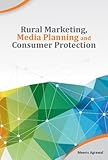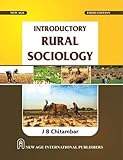 |
Learning Resource Centre Monthly Bulletin |
 |
 |
Learning Resource Centre Monthly Bulletin |
 |
| New Books |
 B94438 Rural Marketing, Media Planning and Consumer Prote By Agrawal, Meenu |  B91688 Introductory Rural Sociology By Chitambar, J. B |  B80038 Decentralization and Empowerment for Rural Develop By Nagarajan, Hari K |
| Click Here to learn about the Recent Books added to our collection on different topics of Management. |
| Articles |
| Factors Influencing Customer Preference for Sustainable Banking in Rural India. By Sina E. S.;Vennila, D IUP Journal of Accounting Research & Audit Practices. Oct-Dec2025, Vol. 24 Issue 4, p239-259. 21p. Abstract :The government of india has implemented measures to support sustainable development, which have predominantly influenced financial institutions` outreach in rural areas. This study addresses the key factors influencing one of the significant stakeholders in banks: the customers. Using purposive sampling, data from 1150 customers was collected in rural areas of southern India. Factor analysis determined the key factors affecting customers` desire to engage in sustainable banking. The study suggests considerable scope for sustainable banking in rural areas. It may involve the development of convenient and easy-to-use digital platforms and online applications that allow rural customers to employ and access eco-friendly banking opportunities. The findings will help policymakers design future sustainability policies, operational guidelines, and strategic decision-making as a part of rural financial inclusion. [ABSTRACT FROM AUTHOR] | |||
| Does multiple job holding raise labour use efficiency of the farm operators? Evidence from rural India. By Drall, Anviksha;Mandal, Sabuj Kumar Applied Economics. Jan2026, Vol. 58 Issue 2, p277-292. 16p Abstract :Amid various agro-climatic shocks when farm income becomes volatile, farmers often diversify income by holding multiple non-farm jobs. While the impact of multiple jobholding on overall farm efficiency is documented in literature, very little is known about the impact of multiple job holding on farm labour use efficiency. This is important as participation in non-farm activities alters farmers` labour allocation decisions between farm and non-farm activities. Using a rich household level panel data from eight Indian states for the period 2010–2014 from Village Dynamics in South Asia (VDSA) Project by International Crops Research Institute for the Semi-Arid Tropics and adopting Data Envelopment Analysis, we estimate labour use efficiency. Our Instrumental Variable Tobit estimation shows that multiple job holding increases farm operators` labour use efficiency significantly. However, the heterogeneity analysis using sub samples demonstrates that the positive impact of multiple non-farm jobs is enjoyed mostly by medium and large farmers. Also, farmers engaged in wage and salary based non-farm employment experience higher labour efficiency once they hold multiple jobs. Self-employed farmers experience higher labour efficiency only if they earn a threshold level of non-farm income. Since multiple job holding improves farm labour use efficiency, more avenues for non-farm employment to be created for agricultural and rural development. [ABSTRACT FROM AUTHOR] | |||
| From a Cash-heavy to a Cashless Economy: How UPI Is Revolutionizing Rural India’s Ease-of-doing Business. By Kumar Sahu, Pritish;Chakraborty, Anwesha;Banerjee, Pratyush Vikalpa: The Journal for Decision Makers. Nov2025, p1. Abstract :Digital payments have emerged as the predominant payment method in India since the introduction of the unified payments interface (UPI) in 2016. This study investigates how this digital transformation has impacted the ease-of-doing business for people residing in rural India. We conduct a computational thematic analysis using a topic modelling technique to analyse unstructured feedback given by sole-ownership-type entrepreneurs operating in the unorganized labour market in rural India to identify the beneficial aspects of UPI on their businesses. The analysis reveals that UPI users appreciate the ease of transactions, unconstrained access to funds, wider reach of customers and transparent monetary transactions.Digital payments have emerged as the predominant method of payment in India since the introduction of the unified payments interface (UPI) in 2016. India has been traditionally a cash-heavy economy, and Indian businesspeople have been accustomed to drawing cash from banks or ATMs to conduct transactions. India does not boast a robust banking system in its rural corners. This creates huge inconvenience among rural traders to execute financial transactions due to a lack of funds. The advent of UPI has brought about a significant change to the professional activities of rural Indians. This study undertakes a scoping investigation of the extent to which this digital transformation has impacted the ease-of-doing business for people residing in rural areas of India. We conducted a computational thematic analysis through semi-structured interviews with 801 UPI users in rural locations of India, utilizing the topic modelling technique latent Dirichlet allocation. This approach is intended to address the issue of credibility that is commonly cited as a major drawback of qualitative research designs. The primary objective was to comprehend the major issues shared by the users regarding their UPI experience with regard to their business-related transactions. The analysis reveals that businesspeople from rural India who have been using UPI appreciate the ease of transactions facilitated by this technology and are content with the benefits it offers to entrepreneurs and workers in the unorganized sector. In terms of ease-of-doing business, the findings revealed that the major benefits were in terms of leveraging more transactions with tourists, which were earlier declined due to a lack of cash, more transparency of transactions, speed of transaction and reduced reliance on middlemen. However, the participants also expressed concerns about security issues and challenges arising from inadequate infrastructure, lack of a legal framework to safeguard against such type of malicious attacks and the potential for fraud. [ABSTRACT FROM AUTHOR] | |||
| Do you wish to explore more articles? Just try using one of the full-text databases below! | |||
| Faculty - Click here to recommend new topics in Rural |
| News |
| India now has 958 million active internet users; 57% of these are from rural areas By The Hindu; Jan 29 2026 |
| Budget 2026–27: PM Awas Yojana in focus as Centre boosts rural and urban housing — what to expect By Times of India; 30 Jan 2026 |
Wish to see more News? Click the link below: |